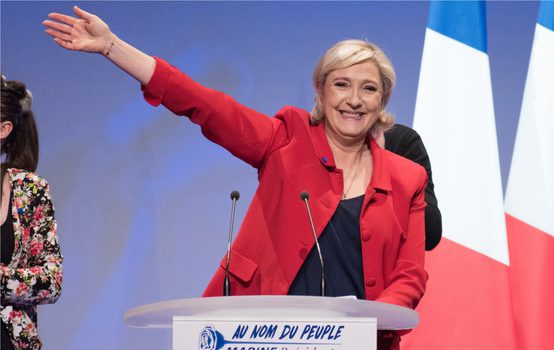Why Not Le Pen?

Ross Douthat has been getting hell for his articulation of the case for Le Pen, so I thought it worth pointing out that he anticipated in that very articulation the most important objection of his various critics:
In the case of Marine Le Pen . . . the main risk is her party. To elevate her to the presidency is to empower the National Front, an organization that despite years of renovation and attempted purges — extending to Le Pen’s own father, Jean-Marie — still includes figures like her successor (briefly; he just resigned) as its leader, who appears to have done the “I’m just asking questions” thing about the gas chambers.
Parties matter, their histories and undercurrents matter, and the Front’s Vichy taint is a good reason to prefer a world where a Le Pen never occupies the Élysée Palace.
It seems to me that the right way to read his piece — which I encourage you to read in full — is as saying: if this is the only strong argument you have against voting Le Pen, then perhaps that is not enough. Le Pen is making an argument about the future, and you can’t permanently win that argument by pointing to the crimes of the past.
Douthat is more willing than I am to say that Le Pen is right about crucial planks of her platform — like a halt to immigration and an end to the Euro. But we agree to a considerable extent that at least she is asking the right questions, and that those who would defeat her — whether this time or next — need to answer those same questions to truly earn their victory.
Which is the main theme of my latest column in The Week:
It is not reasonable to exile the “national question” from politics entirely — and even if it were reasonable, it is not actually possible to do so. The cordon sanitaire has long since failed; the question now is not how to cure nationalism but how to manage it as an ongoing condition. What Le Pen has done to “modernize” her party may be insufficient, but surely part of the burden is on the mainstream parties to make the case for that insufficiency.
The FN’s course is unquestionably risky. But the risks of the status quo have been abundantly in evidence over the past decade, and what is to be done about them? Does anyone, at this late date, really believe that the EU is working? Either it is a failed experiment that needs to be abandoned, or European institutions need to be substantially rethought to make a common currency area work better for the people and not just for the interests of capital. Neither can possibly happen until a major, core country forces the question. What country better than France to force that reckoning?
The same can be said about NATO. Donald Trump argued repeatedly during his campaign that the alliance was obsolete (though he has now reversed himself on this as on so much else), but America could never plausibly reform it because we naturally want it to remain a force-multiplier for American policy rather than a true instrument of collective security. It will take a major European state to force a substantive change. Again, who better than France, which always historically charted an independent course?
Moreover, on neither front is the world going to change overnight were Le Pen to win the presidency. Rather, negotiations would commence for new arrangements. Those negotiations might go well or poorly — but it is a mistake to view any one election in apocalyptic terms.
Finally, it is true that a Le Pen victory would likely be welcomed in Moscow and in Washington, and would be a terrible blow to those who see themselves as the liberal vanguard. But there are other threats to liberal democracy than populist nationalism, and the technocratic order that Macron runs to vindicate may well be one of them. Brussels rules not so much with the consent of the governed as with the conviction that it alone is capable of properly balancing the continent’s manifold interests — which is precisely what ordinary democratic politics is supposed to be for. Is it so unthinkable to prioritize the latter threat over the threat of populism?
And consider the contrasts between Le Pen and her fellow populist-nationalists alongside their similarities. Le Pen is not Donald Trump. She’s not a lazy, narcissistic, ignorant con artist. She’s been at this for years and she knows her stuff. Nor is she Putin, or Erdogan, or even Viktor Orban of Hungary. She’s not running to lead a fragile, young, shallow democracy. She’s not out to restore a lost imperial glory, nor has she advanced a program for colonizing the state and turning it into an instrument of her party. Of the major exemplars of populist nationalism, she may well be the best of the bunch.
I am not a populist-nationalist. I am far too liberal to be a nationalist and far too conservative to be a populist. Nor do I believe that the advocates of populist-nationalism actually have solutions to the profound economic and demographic transformations that are powering their rise across the globe. But I do believe that populism plays an important part in the ecosystem of democracy. And if that banner is going to advance, I might just rather it be carried by someone who cares about our common liberal heritage than by someone hostile or indifferent to them.
Read the whole thing there.
Comments